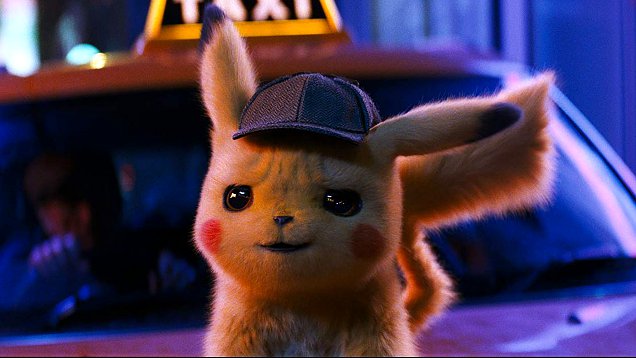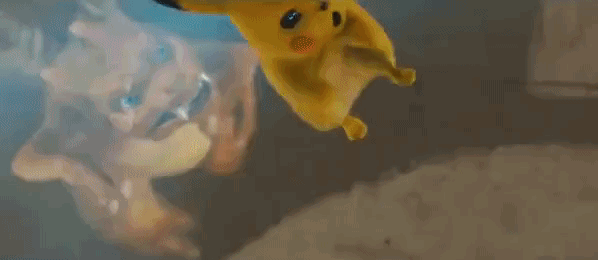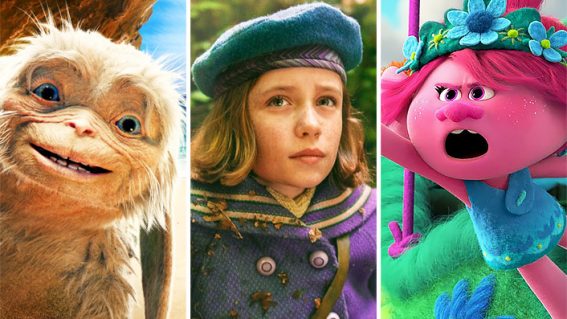Detective Pikachu is risk-averse goop, with a thoroughly kickable CGI sidekick

The world’s smallest and most yellow investigator helps Tim (Justice Smith) search for his father in this blockbuster Pokémon spin-off. Unfortunately Detective Pikachu is ho-hum and ham-handed, says Luke Buckmaster.
Ah yes: the realm of the bad movie featuring a cute out-of-this-world thing and a cast of bemused humans attempting to keep a straight face. That task was harder back in the days of 80s and 90s turkeys such as Howard the Duck and Theodore Rex, because actors used to share the set with actual, handmade creations to which they delivered lines – such as, for instance, a gigantic albino dog-like dragon operated by 25 people, including one for each of its lips.
Nowadays when interacting with such characters, actors typically respond on set to a human (substituted for a creature in post-production) or to nothing at all. In films like the ho-hum and risk-averse Detective Pikachu, one feels a sense of what has been lost: not just the tactile qualities of the beasts but the subtleties of human performance.
Director Rob Letterman’s live action mystery-adventure is based on a 2016 video game of the same name, belonging to the Pokémon universe – a multi-medium morass of spin-offs and tie-ins, declared last year as the highest grossing franchise in history (though Marvel may well have overtaken it). Like most transmedia empires, there are a seemingly infinite number of narrative access points. This story follows 21-year-old Tim (Justice Smith) as he searches for his father, who is presumed dead after a terrible car crash – but who Bill Nighy (in a small but significant supporting role) insists is very much alive.

Tim is thrown out of his reality by vaseline-lensed flashbacks returning him to moments of formative grief – such as a sad interaction with his granny at a train station. His new, er, partner is the yellow, furry and thoroughly kickable titular character (voiced by Ryan Reynolds) who only Tim (but also the audience, unfortunately) can hear.
Early on we see glimpses of ancient pictures – hieroglyphs and drawings on cave walls – of people and Pokémons side-by-side. Isn’t this contemporary Hollywood to a tee: rewriting human history to swap out our ancestors for merchandise. Letterman and his screenwriters should have gone the whole hog and stipulated an eleventh commandment: You Shall Collect ‘Em All.
The plot regularly resets to the same basic coordinates, inserting Tim into situations simultaneously too large to overcome (Pikachu often has to do the grunt work) and too small, in narrative and emotional detail, to mean anything. The film has an annoying habit of returning to previous sequences, through various kinds of flashbacks, and refitting them with new details. The intention is to create unexpected revelations – but it feels more like the story exists as a series of drafts, being rewritten on the fly.
The dialogue is mediocre and occasionally awful (“Wait! We need to tell the public what we’ve found! This is breaking news!” cries the aspiring journalist Lucy, played by Kathryn Newton). Emotional messages are ham-handed. During a quiet exchange between Tim and Pikachu, for instance, the point is made in a most overbearing way that this is a melancholic moment. The sorrowful, squidgy look on Pikachu’s face tells us this; the tear rolling down Tim’s cheek tells us this; the music tells us this; and oh boy does the dialogue tell us this (“He’d be proud of you, kid”).
Some of Nigel Phelps’ Blade Runner-lite (very lite) production design impresses, in a dark skyline and neon billboard sort of way. And occasionally the world-building elements hint at the potential for a spirited, colourful environment. I kept waiting for the film to light up like a pinball machine, but instead it loiters in a kind of aesthetic limbo: refusing to get dark and grimy, and not wanting to go the proverbial double rainbow either.
Always a sense of order is maintained. Howard the Duck, comparatively, was bone-headed and chaotic. In its defence however the titular character did drink, smoke, kvetch, fight and wisecrack – terrible behaviour to match a terrible movie. The legendarily atrocious Theodore Rex is similarly eye-rolling, but at least the filmmakers had the good grace to create weird spectacle inside the film and out, from Whoopi Goldberg’s unsuccessful attempt to jump ship to its ultimate insertion into the bowels of direct-to-video release.
Detective Pikachu is more quality controlled than either of these pictures, though that comes at a cost. It doesn’t bounce or jive with a spirit of invention. Letterman doesn’t believe in the bedrock ethos that it is better to be spectacularly bad than just merely bad. The film is complacent with its mediocrity. Where those other head-scratching productions were train crashes, this one is a knee-grazing accident involving a child’s bicycle. It’s the kind of movie that took very small risks – all of them smoothed over after audience test screenings. The result is homogenised, inoffensive goop.


















